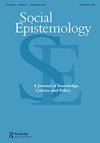阴谋论成为“理论”意味着什么?
IF 2
2区 哲学
Q1 HISTORY & PHILOSOPHY OF SCIENCE
引用次数: 11
摘要
摘要“阴谋论”的贬义往往与普通语言含义联系在一起,这不仅源于阴谋论是关于阴谋的,也源于阴谋理论被视为一种特定的理论。我建议从对“阴谋论”中“理论”的正确认识评价的分歧来理解阴谋论引发的两极分化。通过以这种方式界定阴谋论引发两极分化的典型立场,我的目的是表明,“阴谋论”的贬义概念对于寻找去极端化策略的可能性的研究是有问题的。也就是说,因为它们排除了对阴谋论信仰的认识规范的建设性参与。本文章由计算机程序翻译,如有差异,请以英文原文为准。
What Does It Mean for a Conspiracy Theory to Be a ‘Theory’?
ABSTRACT The pejorative connotation often associated with the ordinary language meaning of “conspiracy theory” does not only stem from a conspiracy theory’s being about a conspiracy, but also from a conspiracy theory’s being regarded as a particular kind of theory. I propose to understand conspiracy theory-induced polarization in terms of disagreement about the correct epistemic evaluation of ‘theory’ in ‘conspiracy theory’. By framing the positions typical in conspiracy theory-induced polarization in this way, I aim to show that pejorative conceptions of ‘conspiracy theory’ are problematic for research open to the possibility of finding depolarization strategies. That is, because they preclude constructive engagement with the epistemic norms governing (the rationales foundational of) belief in conspiracy theories.
求助全文
通过发布文献求助,成功后即可免费获取论文全文。
去求助
来源期刊

Social Epistemology
Multiple-
CiteScore
2.60
自引率
17.60%
发文量
60
期刊介绍:
Social Epistemology provides a forum for philosophical and social scientific enquiry that incorporates the work of scholars from a variety of disciplines who share a concern with the production, assessment and validation of knowledge. The journal covers both empirical research into the origination and transmission of knowledge and normative considerations which arise as such research is implemented, serving as a guide for directing contemporary knowledge enterprises. Social Epistemology publishes "exchanges" which are the collective product of several contributors and take the form of critical syntheses, open peer commentaries interviews, applications, provocations, reviews and responses
 求助内容:
求助内容: 应助结果提醒方式:
应助结果提醒方式:


